Alexander 3.3 Arrian's Sources
Alexander the Great (*356; r. 336-323): the Macedonian king who defeated his Persian colleague Darius III Codomannus and conquered the Achaemenid Empire. During his campaigns, Alexander visited a.o. Egypt, Babylonia, Persis, Media, Bactria, the Punjab, and the valley of the Indus. In the second half of his reign, he had to find a way to rule his newly conquered countries. Therefore, he made Babylon his capital and introduced the oriental court ceremonial, which caused great tensions with his Macedonian and Greek officers.
Official propaganda: Callisthenes
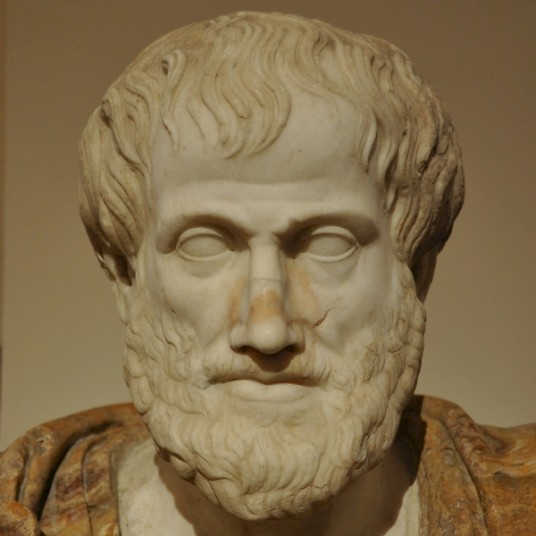
In Alexander's company was a professional historian named Callisthenes of Olynthus (c.370-327), who had already published a Greek history of the years 387-356. The two men may have met as members of the circle around the Macedonian philosopher Aristotle of Stagira, who was an uncle of the historian and the teacher of the future king. During the campaign, Callisthenes' main duty was to write the Deeds of Alexander, but he was also sent on scientific missions. When Alexander was in Egypt, he sent his historian to Nubia, where he discovered the cause of the Nile flood; and in Babylon, Callisthenes supervised the translation of the Astronomical diaries, which were used by Callipus of Cyzicus to reform the Greek calendars.
In the summer of 327, Callisthenes voiced protests against the introduction of proskynesis (an aspect of the Persian court ritual) among the Macedonians, and lost Alexander's favor (more...). It is not clear what happened to Callisthenes: Aristobulus and Ptolemy, officers who were present and wrote histories of the campaign, gave different accounts - he either died in prison or was crucified.
The book of Deeds of Alexander is now lost, but underlies much of what was written later. It seems to have been the work of a professional flatterer. For example, it contained many allusions to Homer's Iliad, a calculation of the date of the fall of Troy (exactly thousand years before Alexander's visit to the sacred city), and references to towns mentioned by Homer and visited by Alexander. Callisthenes stressed Alexander's manly behavior and the effeminate weakness of the Persians. Another story that Alexander must have appreciated is that of the sea doing obedience to the new Achilles (text). One thing is certain: Callisthenes did not object to Alexander's claim to be the son of Zeus.
It is not clear when the book of Deeds of Alexander was published, but secondary authors do not quote it to describe the events after 329, and it is possible that Callisthenes considered the death of Bessus, the last leader of the Persians, to be a fitting climax of his history: after all, Alexander had now conquered the whole of Persia, had reached the Jaxartes, had founded Alexandria Eschatê, and seemed to have triumphed after exactly five years of fighting.
Be this as it may, it is certain that the work was not published in yearly installments to inform those remaining at home (as Julius Caesar was to publish his Gallic War). It was published as a unity, which can be shown from the fact that it consistently portrayed Alexander's right hand man Parmenion as overprudent. Before 330, there was no reason to describe Alexander's most trusted and capable general like this; however, in November, he had been executed because his son Philotas was suspected of a coup (text).
It seems that later historians had access to a sequel to Callisthenes' Deeds of Alexander. This work was perhaps based on the Royal Diary that is quoted by several authors who describe the death of Alexander (text). That would explain why we have detailed information about chronology and appointments. However, this is not certain.
Callisthenes' book on the Deeds of Alexander and the Royal Diary are primary sources. They are now lost, but were used by secondary authors like Cleitarchus and Ptolemy, who are at the beginning of the "vulgate" and the "good" tradition. Therefore, they share the same chronology and mention the same officials. Their works are now lost too, but can be reconstructed from tertiary sources: Diodorus of Sicily and Curtius Rufus, Arrian, and Plutarch.
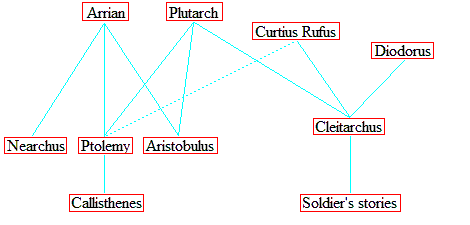
Arrian of Nicomedia
Lucius Flavius Arrianus - or Arrian, as he is usually called in the English language - was born in Nicomedia, one of the Greek towns in the Roman empire, in c.87 CE. He read philosophy in Nicopolis, where the famous philosopher Epictetus had a small school, which counted the future emperor Hadrian among its students. Arrian joined the army, was stationed in Bavaria, must have visited Germania, and took part in the Parthian war of the emperor Trajan (114-117). When his friend Hadrian became emperor, Arrian was rewarded with a seat in the Senate. In the following years, he served as governor of Andalusia, became consul (129 or 130) and was governor of Cappadocia, where he fought a brief war against the Alans, a nomad tribe from Kazakhstan. Later, Arrian settled in Athens, where he died after 145.
Arrian may not have been a king like Alexander, he knew courtly life, civil administration, and war. Moreover, the war against the Parthians had offered him an opportunity to visit Mesopotamia, and he probably visited places like Gaugamela and Babylon. This makes his Anabasis (Journey Up-Country) a very good source. In fact, it is the most important source on the reign of Alexander. In the prologue, Arrian explains which sources he has used:
It seems to me that Ptolemy and Aristobulus are the most trustworthy writers on Alexander's conquests, because the latter shared Alexander's campaigns, and the former - Ptolemy - in addition to this advantage, was himself a king, and it is more disgraceful for a king to tell lies than for anybody else.
Few modern scholars will be impressed by the last remark, but all of them agree that Arrian chose the right sources for the right reason: Ptolemy and Aristobulus had been eyewitnesses. However, Alexander had read more than these two authorities and offers sometimes stories that he had not found in these authors.
Like Cleitarchus, who stands at the beginning of the "vulgate" tradition, Arrian tried to give some sort of assessment of Alexander, but his opinion is the opposite of Cleitarchus', who had presented the Macedonian king as a young prince who had been corrupted by his constant success. Arrian, on the other hand, admires Alexander, although he is too much a philosopher to be completely uncritical. Sometimes, he condemns aspects of the conqueror's behavior, but as a whole, he is positive about Alexander's achievements. A typical part of the Anabasis is book 4, where Arrian places three painful incidents together and condemns Alexander's behavior: chronologically, two of them do not belong at this place, and by treating them together, he has prevented that the reader came up against the hard facts too often.
Arrian also published an Indikê, which is essentially an appendix to the Anabasis. This remarkable text probably tells less about India than about the literary tastes of Arrian's age. To start with, it is entirely based on the Indikê by Alexander's fleet-commander Nearchus (below). More recent descriptions of India are quoted by several Christian authors and Arrian's younger contemporary Philostratus, but Arrian chose to ignore these recent sources because they were written in "Koinê-Greek", which was considered ugly in the second century CE. Nearchus, on the other hand, had written decent "classical" Greek and even though the contents of his Indikê were outdated, Nearchus was to be preferred. A second point is that Arrian choose to write his own Indikê in the Ionian dialect. This was done because the classical text on geography, the Histories of Herodotus of Halicarnassus, were written in that dialect and contained no reliable information on India.
Another book by Arrian is the Events after Alexander. It is known from a summary by the Byzantine patriarch Photius (820-897), and breaks off rather abruptly. Maybe this work remained unfinished (more...).
It is a tribute to the quality of these works and their author, that modern scholarship usually follows Arrian, who personifies the "good" tradition, and adds details from the authors of the "vulgate" tradition. It is only since the publication of the Astronomical Diaries (1988) that oriental texts are receiving attention.
Ptolemy
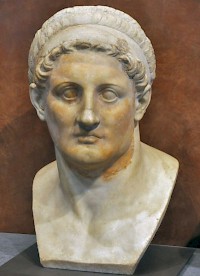
Ptolemy was born in 367 and was a youth friend of Alexander. He took part in the battle of Issus, joined the journey to the oracle of Ammon, was present during the burning of Persepolis (his mistress Thais played an important role; text), and had his first independent commands during the wars in Sogdia. He was never one of Alexander's main commanders, but remained one of his closest friends and bodyguards, a title that means something like adjutant.
Ptolemy rose to prominence immediately after the death of Alexander: he was appointed satrap of Egypt and started to behave as an independent ruler. Alexander's mentally deficient brother Arridaeus was unable to prevent it, and his regent, general Perdiccas, came with an army to Egypt to discipline Ptolemy, but he was defeated. A few months later, Ptolemy managed to obtain Alexander's dead body (320), which was interred in Mamphis and, later, in Alexandria. After this, he was recognized as an independent ruler, and had himself proclaimed king in 306. This, and not the conquest by Alexander, meant the formal end of the unity of the Achaemenid Empire.
Ptolemy wrote memoirs on Alexander's campaigns. They are almost entirely known from Arrian's Anabasis, but this is sufficient to come to some conclusions about their nature. In the first place, he uses Callisthenes' Deeds of Alexander and a sequel, because he has the correct chronology of the events and knows the names of the appointees. In the second place, Ptolemy sometimes exaggerates his own role. For example, he gave himself an important role in the battle near Issus. In the third place, the work was biased against Antigonus Monophthalmus, one of Ptolemy's rivals in the wars after the death of Alexander; Antigonus' successful campaigns in what is now Turkey, are completely ignored. In the fourth place, Ptolemy concentrated on the war; there are no indications that his memoirs contained digressions. A unifying psychological concept, like Cleitarchus' idea that Alexander's success corrupted him or Aristobulus' pothos-motif (below), seems to have been absent: in Ptolemy's view, Alexander had been a rational expansionist.
At one place, Ptolemy corrects Cleitarchus' account of Alexander's campaigns, and this proves that Ptolemy's history was published after the History of Alexander, which can be dated between 310 and 301. However, we can perhaps be a little bit more precise. There are indications that Ptolemy's memoirs were published before 301, because in that year, Antigonus was killed, which made Ptolemy's bias against his rival rather pointless. This argument, however, is not conclusive.
It is possible that Ptolemy started to write his memoirs in order to prove that he was worthy of the royal title he had assumed: for example, he wrote that he had killed an Indian king and had stripped him of his armor, an incident that must have reminded his readers of the behavior of the heroes of Homer, who had been kings.
Aristobulus and other officers
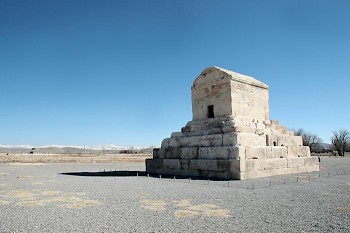
Aristobulus was probably one of the friends of Alexander's father Philip and accompanied Alexander on his war in the East. Since he is never mentioned as a participant to the fights, it has been assumed that he was either a military engineer or a non-military official. It is certain that Alexander ordered him to repair the tomb of Cyrus the Great, which had been neglected or intentionally desecrated (text). Aristobulus may have lived in Alexandria, published his memoirs of the Persian campaign at the age of eighty-four, and died at Cassandria in Macedonia after 301.
Aristobulus' account of Alexander's conquests - a primary source - is best known from Arrian. It is also quoted by other authors, but there are indications that not all quotations are authentic. He may have been Alexander's greatest admirer, because when there are more than one versions of the same event, Aristobulus usually gives the kinder version. For example: all authorities agree that Alexander was a heavy drinker, but Aristobulus explains that this was merely because he loved to be with his friends. And when a drunken Alexander killed Clitus, Aristobulus says that it was Clitus' own mistake. Another example: Ptolemy writes that Alexander ordered Callisthenes, who had criticized him in public, to be crucified, and Aristobulus says that the man died in prison.
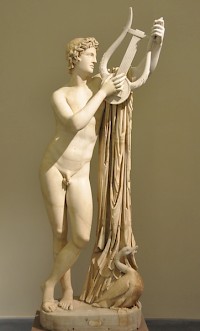
It is likely that the motif of pothos was introduced to the Alexander literature by Aristobulus. Pothos means "longing", and this was believed to be a good way to describe Alexander's inner drive. So, our sources mention that Alexander was longing to cross the Danube, untie the legendary knot at Gordium, found an Egyptian city, go to the oracle of Ammon, visit Nysa, capture Aornus, sail the Ocean, or see the Persian Gulf. The word - or its Latin translation ingens cupido - became a standard description of Alexander, and perhaps one of the attractions of the idea was that pothos could also signify a desire to die: pothos was the name of the flower that Greeks placed on someone's tomb. An author who had used this word, could leave Alexander's behavior during battles and sieges and his drinking habits unexplained. Like Achilles, Alexander had chosen to be famous and die young.
Another officer who wrote memoirs, was Onesicritus of Astypalaea (c.380-c.305). He was a pupil of the famous philosopher Diogenes of Sinope, who had had a famous conversation with Alexander in Corinth (text). Onesicritus is not heard of during the first half of Alexander's campaign and makes his first appearance in our sources in 326, when he translated the conversation between Alexander and the Indian sages at Taxila.
During the voyage to the south, Onesicritus was the helmsman of Alexander's royal ship; when a large part of the Macedonian army had to be shipped back to Babylonia, he was also present.
After his return, he published How Alexander was educated, a primary source that is now lost. It is certain, however, that in this book, he claimed to have been the commander of the fleet, which was not true and caused admiral Nearchus to write an account of his own.
This Nearchus was born on Crete but had grown up in Amphipolis in Macedonia; he had befriended the crown prince Alexander and was appointed satrap of Lycia and Pamphylia in 334. In 329, he was recalled and brought reinforcements to Alexander, who was in Bactria. In India, Nearchus initially had some minor commands, but was made admiral of the Macedonian navy (326); in this quality, he was responsible for the transport of the army to the Ocean and - later - for the shipping of troops to Babylonia. In 324, he married to a daughter of Alexander's Persian mistress Barsine. After the death of Alexander, he backed Heracles, the son of Alexander and Barsine; the boy was killed, however, and Nearchus retired to write a book called Indikê.
The Indikê is now lost, but its contents are well-known from several sources, especially the Indikê by Arrian. It seems to have consisted of two parts: the first half contained a description of India's borders, size, rivers, population, castes, animals - especially elephants -, armies and customs; the second half described Nearchus' voyage home. It also contained some remarks about Onesicritus, who is portrayed as incompetent. (An example can be found here.) Nearchus' Indikê seems to have ended with a description of the last days of Alexander.
Plutarch of Chaeronea
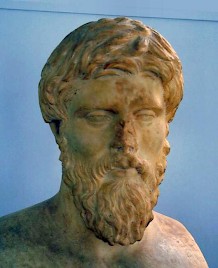
It is not exaggerated to say that, together with Augustine of Hippo and Aristotle of Stagira, Plutarch of Chaeronea (46-c.120) is the most influential ancient philosopher. He may lack the profundity of Augustine - the most influential philosopher in the early Middle Ages - and the acumen of Aristotle - considered the master of all intellectuals of the late Middle Ages -, but the sage of Chaeronea is an excellent writer and from the Renaissance to the present day, his 227 moral treatises have found a larger audience than any other ancient philosopher. In his own age, he was immensely popular because he was able to explain philosophical discussions to non-philosophical readers, Greek and Roman alike. The fact that he was priest in Delphi will no doubt have improved his popularity.
His oeuvre consists of biographies and moral treatises, although his biographies are in fact moral treatises too: he describes the careers of a Greek and a Roman, and compares them to understand certain character traits. The result is not only an entertaining biography, but also a better understanding of a morally exemplary person - which the reader can use for his own moral improvement.
Plutarch writes in the prologue of his Life of Alexander/Life of Julius Caesar:
It is not histories I am writing, but lives; and in the most glorious deeds there is not always an indication of virtue of vice, indeed a small thing like a phrase or a jest often makes a greater revelation of a character than battles where thousands die.note
This is a good description of what Plutarch has to offer. He will not give an in-depth comparative analysis of the causes of the fall of the Achaemenid Empire and the Roman Republic, but offers anecdotes with a moral pointe. We should read his Life of Alexander as a collection of short stories, in which virtues and vices are shown.
The most important theme (one might say: Plutarch's vision on Alexander's significance in world history) is that he brought civilization to the barbarians and made them human; Alexander is, so to speak, a practical philosopher, who improves mankind in a rather unusual but effective way. This theme is more explicitly worked out in a writing called The fortune and virtue of Alexander (example). Alexander's presumed philosophical interests are shown in stories like Alexander's conversation with Diogenes.
Plutarch has read many books on Alexander, and one cannot simply say that he belongs to the "vulgate" tradition (which follows Cleitarchus) or the "good" tradition (which follows Ptolemy). He tells his own, moral story and has taken elements from all traditions. His Life of Alexander is especially interesting because it contains a great many childhood stories, which he seems to have taken from a book called Alexander's education, written by a Macedonian named Marsyas, who went to school with the crown prince.
If the reader of this article has the impression that Plutarch is a boring moralist, he is mistaken. His sincere interest in Alexander and his men as human beings makes the Life the most readable of all publications on the Macedonian king - both ancient and modern.